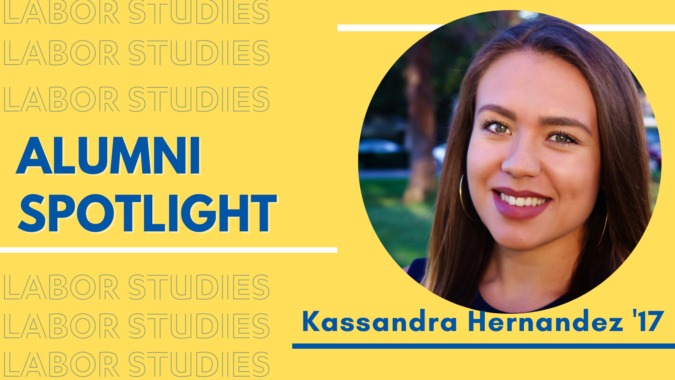Labor Studies Alumni Spotlight: Kassandra Hernandez, Social Justice Researcher
By Guadalupe Guzman
1. Can you tell us about yourself and your background?
I’m a first-generation college student, Latina, and daughter of Mexican immigrants. After graduating from UCLA, I took a year off to serve through AmeriCorps in the California Central Valley before pursuing my Master of Public Policy (MPP) degree from UCLA Luskin School of Public Affairs. I’m also an alumna of the American Economic Association Summer Program (AEASP), at the time hosted by Michigan State University. During my MPP, I became super interested and involved with research, and decided to pursue a Ph.D. in Economics or Public Policy (expecting to begin Fall 2021). My research interests include labor, income inequality, immigration, and environmental economics, all with an emphasis on social justice. I aspire to be an economist, professor, policy analyst, and student advocate.
2. Can you tell us about your current position and the responsibilities?
I am currently a Research Analyst at the UCLA Latino Policy & Politics Initiative (LPPI), where I am responsible for reviewing, managing, and proposing different ideas throughout the entire research process. I work with faculty experts, affiliated partners, and LPPI staff and Fellows on issues of economic mobility and opportunity, health and healthcare access, and elections and voting rights, specifically as they affect the Latinx community and other communities of color. We publish reports, briefs, and factsheets– to simply name a few deliverables. Aside from that, I also assist with the management of our leadership component through the Policy Fellows program and provide grant writing support as needed.
3. What made you decide to join the Labor Studies Program?
I joined the Labor Studies Program because of two main reasons: (1) its interdisciplinary nature, with classes overlapping with education, Chicana/o studies, and public health that catered to my diverse interests and (2) I felt like I belonged, not simply in the room as we discussed material, but in the material itself. I saw myself, my family, and my community in readings on workers’ rights, immigration, health access, etc. and I really valued that my experience was felt, seen, and heard.
4. What about Labor Studies had the most impact on you?
Aside from feeling like I belonged, I really enjoyed the extent to which hands-on learning and research was emphasized in the minor, like the Labor Summer Research Internship Program that allowed me to gain research skills with work that would also be particularly useful to community organizations. Professors in the minor were the first in my academic career to validate my experiences, interests, and career aspirations as a “researcher” devoted to social justice.
5. During your time at UCLA, were you involved in any campus activities on campus or within your community?
Yes! I was involved primarily with Proyecto de Jornaleros at UCLA and the Community Development and Social Justice Scholars program out of the Academic Advancement Program (AAP).
6. Do you have any advice for graduating seniors?
Don’t be afraid to start! It’s very easy to fall into the false assumption that people just somehow “know” what they’re interested in and want to pursue– and how to get exactly where they want to be. But, life is not linear; I only know what I’m passionate about because I started somewhere and adjusted until it felt right. A special message to my fellow first-gen college students: a lot of spaces can feel foreign, and at times overwhelming, but every experience leads you where you need to be. You deserve to be there; keep going!
7. Can you tell us about a role model who has inspired and influenced you and why?
As someone with long-term career aspirations of using economics to advise policy, while also mentoring women and students of color, I really admire one of my mentors and previous professor, Dr. Lisa Cook from Michigan State University. Not only did she advise me on research methods and continues to help me navigate the academic and professional space of Economics, but she is very intentional, vocal, and genuinely committed to mentoring students traditionally underrepresented in econ (women, people of color, first gen, etc.) at all levels of the pipeline. She’s worked in so many spaces, like the U.S. Treasury, the Obama administration, and now with Biden’s transition team and is such an inspirational champion of change.


